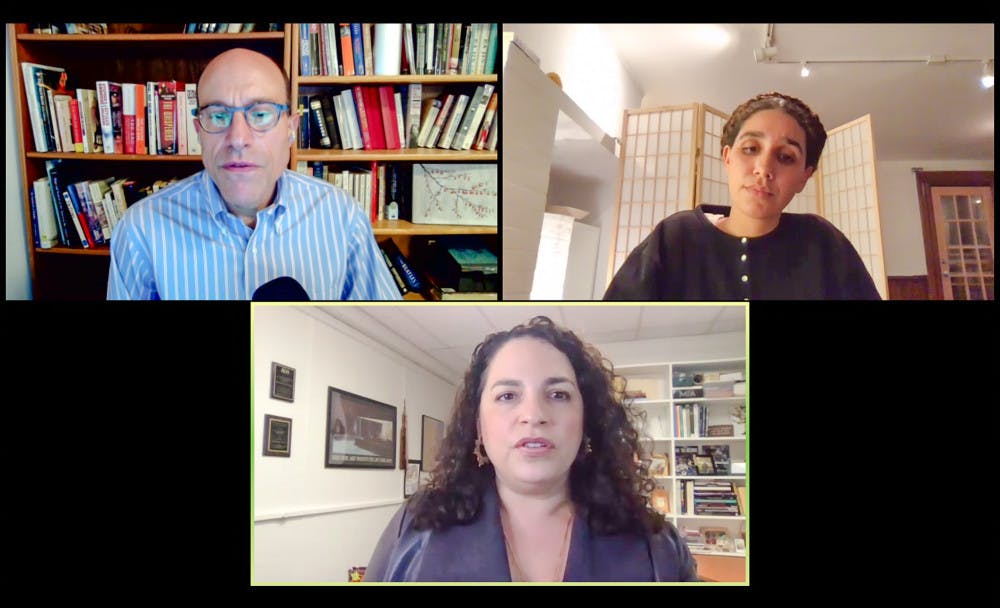The Watson Institute for International and Public Affairs welcomed director Garrett Bradley for a Monday evening conversation about her new documentary “TIME.” Bradley was joined by Associate Professor of Sociology Nicole Gonzalez Van Cleve and Director of the Watson Institute Edward Steinfeld. The event, titled “Mass Incarceration: A Discussion with TIME Director Garrett Bradley,” was a part of the John F. Kennedy Jr. Initiative for Documentary Film and Social Progress, a joint series organized by the Watson Institute and the Brown Arts Initiative.
Bradley’s “TIME” follows Sibil Fox Richardson, “Fox Rich,” an entrepreneur and mother of six children, as she fights for the release of her husband Rob from the Louisiana State Penitentiary, commonly known as Angola. In the 1990s, Rich and Rob committed an armed bank robbery. Rich served three and a half years for her crime, and Rob is serving a 60-year sentence.
Steinfeld began the event by acknowledging Bradley’s past works and the accolades she has received, including a Special Jury Award she garnered at the New Orleans Film Festival for her first feature film, “Below Dreams,” in 2014, and the Short Film Jury Award in Nonfiction at the Sundance Film Festival for her 2017 short documentary film “Alone.” “TIME,” her most recent work, won her the U.S. Documentary Directing Award at the 2020 Sundance Film Festival.
Bradley thanked Steinfeld for inviting her to speak at the Watson Institute, and described her process in creating the film.
“For me personally, it’s really important to ask questions before you start a project. Sometimes, questions in many cases are more important than answers in terms of a value system, and it allows you to take a certain ground,” Bradley said.
She also noted her interest in creating this film. “As a stranger, I asked the family, ‘Why do you want to make this film?’ They felt their story was the same as 2.3 million other families and that by sharing their story, they would offer some hope,” she said. Bradley soon realized that the concept of hope was incredibly vague, and that it was her job to create a film that would articulate hope within the specificity of the family.
Gonzalez Van Cleve pointed out the theme of the currency of time throughout the film. “If we think about it, talking philosophically, all you have is your time when you strip the world away. The greatest punishment is to take those years away, not just from the incarcerated person, but it is a web that extends” to family and friends, she said.
The panel also discussed the cardboard cutout of Rob Rich featured in the film, which Bradley identified as crucial in combating erasure and invisibility and “enforcing the importance of as many optics around the family’s situation” as they can.
Bradley additionally compared the concept of visibility for participants of the Black Lives Matter movement and those facing incarceration. She noted how the Black Lives Matter movement inspired an increase in support and white allyship following the death of George Floyd, and how that brought more attention to the movement. In comparison, she noted the lack of activism for those facing incarceration.
One of the key highlights of the film was the inclusion of Fox Rich’s family videos archive, which totaled over 100 hours. Bradley believes that Fox’s videos helped to articulate the idea of the American Dream and reimagined what a wholesome family could look like.
The event concluded with Bradley describing her thoughts on the future of the film, and how she hoped it could be viewed as a place of solace.
“When you make something, you want to try and do it in a way that this isn’t the end-all, be-all,” she said. “I hope this is specific enough for you to connect with it, and understand something hopefully you didn't before.”

Rebecca Carcieri is an arts & culture editor. She is a senior from Warwick, Rhode Island studying political science.





